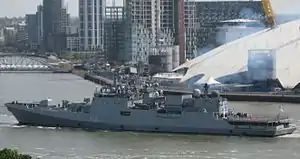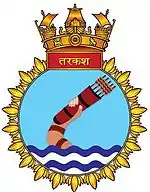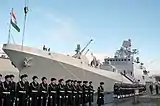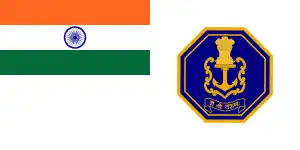INS Tarkash
INS Tarkash (F50) is the second Talwar-class frigate constructed for the Indian Navy. She is part of the second batch of Talwar-class frigates ordered by the Indian Navy. She was built at the Yantar shipyard in Kaliningrad, Russia. She was commissioned to Navy service on 9 November 2012 at Kaliningrad and joined the Western Naval Command on 27 December 2012.[3][4]
 | |
| History | |
|---|---|
| Name | INS Tarkash |
| Namesake | Quiver |
| Ordered | 14 July 2007[1] |
| Builder | Yantar Shipyard |
| Launched | 23 June 2010 |
| Commissioned | 9 November 2012 |
| Homeport | Mumbai |
| Status | in active service |
| Badge |  |
| General characteristics | |
| Class and type | Talwar-class frigate |
| Displacement |
|
| Length | 124.8 m (409 ft 5 in) |
| Beam | 15.2 m (49 ft 10 in) |
| Draught | 4.5 m (14 ft 9 in) |
| Propulsion |
|
| Speed | 30 kn (56 km/h; 35 mph) |
| Range |
|
| Complement | 300 (40 officers) |
| Armament |
|
| Aircraft carried | 1 × Ka-28 Helix-A, Ka-31 Helix B or HAL Dhruv helicopter |
Design
Tarkash belongs to the second flight (F45, F50, F51) of Talwar class of guided missile frigates. These are modified Krivak III-class frigates built by Russia. These ships use stealth technologies and a special hull design to ensure a reduced radar cross section. Much of the equipment on the ship is Russian-made, but a significant number of systems of Indian origin have also been incorporated. The main difference between Tarkash and the earlier flight of Talwar-class ships (F40, F43, F44) is the use of BrahMos missiles in place of the Klub-N missiles in the earlier ships. It is the second of the three frigates built in Russia as a follow-up order to the first batch of Talwar-class frigates.
Construction

Tarkash was launched on 23 June 2010 at Yantar Shipyard in Kaliningrad, Russia. Her delivery was delayed from the original goal of October 2011 due to labour shortages and delays in equipment deliveries. She departed the Yantar shipyard on 24 May 2012 to begin her sea trials. The sea trials were successfully completed in the month of August 2012.[5]
On 9 November 2012, Tarkash was handed over to the Indian Navy by Yantar Shipyard.[6][7] She joined the Western Naval Command on 27 December 2012.[8]
Operations
Operation Raahat
In March 2015, Tarkash was deployed with INS Mumbai and INS Sumitra as part of Operation Raahat to provide protection and support to Indian ships and aircraft involved in the evacuation of Indian citizens from Yemen during the military intervention.[9]
Gallery
 INS Tarkash during its commissioning ceremony.
INS Tarkash during its commissioning ceremony._and_JS_Kaga.jpg.webp)
_at_Helsinki%252C_Finland_(2).jpg.webp)
References
- "Modified Krivak III Class".
- "Indian Navy Ships". Indian Navy. Retrieved 1 January 2013.
- "Talwar class frigate". Indian Navy. Retrieved 1 January 2013.
- INS Tarkash completes sea trials for Indian Navy
- "Russian Shipyard Delivers Indian Navy Warship". 9 November 2012. Retrieved 13 November 2012.
- "Stealth Frigate INS Tarkash Joins Navy". Indian Navy. 12 November 2012. Retrieved 13 November 2012.
- "INS Tarkash joins Western Fleet at Mumbai". Indian Navy. 31 December 2012. Retrieved 31 December 2012.
- "Indian ship in periphery of Yemen waters, awaits local clearance". First Post. 31 March 2015. Retrieved 1 April 2015.
